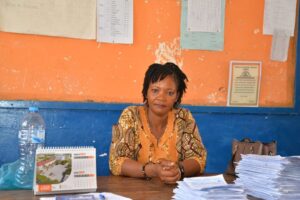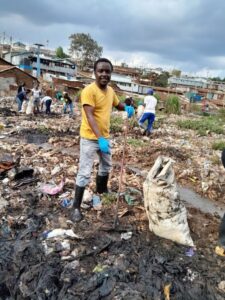Race to Resilience partner initiatve wins World Habitat Award for early warning tool
By Climate Champions | March 7, 2024
Partner: DARAJA
Implementer: DARAJA and local partners, including TMA (Tanzania Meteorological Authority, Kenya Meteorological Department (KMD), Kounkuey Design Initiative (KDI)
Country & Region: Kenya and Tanzania, Africa
SAA Impact Systems: Human Settlements
Impact / Beneficiaries: 1 million people in Kenya and Tanzania
People living in informal urban settlements are particularly vulnerable to extreme weather, like storms, floods and heatwaves. Yet these same communities are often unable to access weather information that could help save their lives or prevent devastating damage to their homes and livelihoods.
DARAJA (Developing Risk Awareness through Joint Action) is a weather forecasting and early warning system specifically for residents of informal settlements. It operates in Kenya and Tanzania, where it provides regular, reliable weather information in accessible, easy-to-understand formats. The service also encourages people to carry out repairs to their homes and public spaces to minimize weather-related damage.
Informal settlement communities were heavily involved in the design of the service, which is run by global social enterprize and Race to Resilience Transformation Partner, Resurgence, in partnership with a wide network of local organizations. DARAJA has received $2 million in funding through Resurgence and has an annual budget of $300,000.
Since September 2018, DARAJA has provided almost 1 million people in Kenya and Tanzania with better weather information, and it is believed that accessing the service has led to a 300% increase in household repairs made in response to weather forecasts in Nairobi, and a 122% increase in Dar es Salaam.
The service is now developing in Sudan, Uganda and Ethiopia. It is also being adapted for use in small island states. DARAJA hopes 25% of the 1 billion people living in informal settlements worldwide will be able to access its services by 2030.
In action
Agnella Malilima (31) is a resident living at the informal settlement of Kigogo Mbuyuni in Dar es Salaam Tanzania, staying at Kigogo with her parents and siblings in a 3-bedroom house.
Before the introduction of DARAJA project at Kigogo settlement Agnella admitted that the decision to not follow the weather information, adversely affected her in various ways; some days she did not go to work because she had to help her parents at home after being hit by floods or extreme high temperatures. This caused the delay in receiving her monthly salary of 200,000 TZS ($80) a couple of months in 2017 and 2018. When floods occurred, she had to use a lot of time to recover from the impacts of flood like removing mud at home, washing clothes with stains and supervising the masons to do the repair of the house. In between October – December, she bought the bricks costing her approximately, 150,000 TZS ($60) to do the repairing of their house. Her father is also a very old man and blind. When they got flooded, she had to spent a lot of time making more arrangements about her father on where she could take him so he could stay.
When CCI community team in Tanzania and Resurgence (the UK partner) started implementing DARAJA project at Kigogo around December 2018, she started to understand about DARAJA and after joining the saving group, she learned about federation activities and how they work with organizations such as CCI to address community problems relating to climate change, entrepreneurship, water and sanitation.
“After being told about the importance of paying attention to access, understand and using weather information to reduce climate change impacts, I directly thought about the suffering that myself, my father and family were experiencing. I started to volunteer in the project activities and I was at the frontline to engage more in the project. But what attracted me most it was the involvement of TMA (Tanzania Meteorological Authority – Tanzania’s national meteorological organisation). These are very professional and educated people but they decided to work closely with us to teach and ensure we understand all matters of weather and climate. It was amazing and I was later selected by Stella (at CCI) to be among 5 community members of Kigogo who were making SMS texts from the downscaled forecast we received from CCI and TMA to simplify the forecast in a language that majority of our people here understood, and in turn, so we could send to 20 community members and reach most of our settlement. I am proud of that moment and up to now I am still a good follower of these TMA information on a day-to-day basis as I can now quickly comment when the information is shared through DARAJA’s WhatsApp group.”
Agnella was able to attend her work on time during rainy seasons and was paid without losing out. She had planned to work and earn a specific amount of money, approximately 150,000TZS ($60) that she later on used to repair the house and to raise a foundation of their house to reduce the flood water to easily enter through their home. She further said, as a family which has low income and living at low-income community, they have been able to save some amount that they were losing in the past. But now Agnella and her family are taking preventative measures earlier and advising her fellow community members, especially neighbors, to take such measures so they won’t get affected by extreme weather on an individual or community basis. Furthermore, as a family they have been able to help their father who is blind by helping him to move early to a safe place when their settlement is flooded.
***
Esther Lugulu is a teacher at Gilman Rutihinda Primary School, in the Kigogo Mbuyuni informal settlement in Dar Es Salaam, Tanzania. She lives in Kigamboni municipal, more than 10 kilometers from where she works. Esther rarely used weather information in her day-to-day life, despite extreme weather and climate change affecting her work.

Esther said “At school we had low attendance of students… approximately 10% in each class during the rainy season, because most of the students live in this flood plain or lower Msimbazi basin.
By providing early warning weather information, the DARAJA project offered a practical solution to this problem. Esther explains “We did not foresee that, by just following and using detailed or advanced weather information, we could boost and maintain students’ attendance at school and contribute to a better academic performance. We learnt this through the DARAJA project.”
Esther became involved in the project when the CCI Tanzania community team and Resurgence UK went to her school to conduct a baseline study. She and the students were trained by TMA through a students’ club, and acted as DARAJA ambassadors, who in turn now educate their parents and guardians at home.
Esther acknowledges that the DARAJA project has improved conditions in the school community. There is now a dedicated room for students to store their bags when severe rain is forecast, and DARAJA’s training about the effects of climate change and extreme weather has catalyzed positive changes in personal hygiene, like better hand washing, tending to the school gardens and taking care of the environment in general.
Esther feels that students are more proactive in taking action and through DARAJA’s early warning weather information and training, she, her colleagues and students are better equipped to adapt to climate change.
***
James Kirika (37) is a resident living in the informal settlement of Laini Saba in the city of Nairobi, which is in the country of Kenya.
Where James lives in Laini Saba. It is populated with a lot of small businesses that are established along the railway and the streets. People have also built their homes and businesses on top of the drains. Before DARAJA was introduced, whenever there was heavy rainfall, these properties immediately got damaged and people’s lives were sometimes tragically lost.
 James’ first experience of DARAJA was when Kounkuey Design Initiative (KDI) Kenya, a local community organization, asked him, as he was a community leader in Laini Saba to become involved on a voluntary basis with the weather and climate service that was to be introduced in 2018, called DARAJA. Each leader in turn brought five people behind them, as any weather and climate advice and information would then be shared with their wider community.
James’ first experience of DARAJA was when Kounkuey Design Initiative (KDI) Kenya, a local community organization, asked him, as he was a community leader in Laini Saba to become involved on a voluntary basis with the weather and climate service that was to be introduced in 2018, called DARAJA. Each leader in turn brought five people behind them, as any weather and climate advice and information would then be shared with their wider community.
KDI, James and the community leaders and teams were then brought into regular co-design and co-production meetings with Kenya Meteorological Department (KMD) and were involved in co-designing new weather forecasts that were: timely, in a language they understood and gave advance warnings of extreme weather with a colour code, where for example, red was deemed an emergency.
James and the Weather Mtaani leaders translated all the weather information from KMD regularly into Swahili (their local language) and gave this information, with advice, to their wider community.
In addition, before the rainy season in October, November and December, Weather Mtaani would organize with the communities to clear up their communal drains. The first time they did this, through DARAJA, in Laini Saba, they received the weather forecast on the Friday. On Saturday they did the community drain clear up, and by Sunday when the heavy rains came, for the first time they did not have floods in their homes or buildings.
The community was not just impressed but extremely grateful for this first preventative community action through the DARAJA project. The community had suffered the loss of lives through the floods; people were swept away from their homes from the heavy rains, as well as individuals lives lost on their motorbikes during flooding.
James said, “DARAJA came through as a saviour to people’s lives and how they were living. And it has prevented them from losing their property and losing their lives.
The challenge is always how to market Weather Mtaani to new residents so they get involved and see the benefits to their lives, so it is good to see that there is a new DARAJA project starting again this year in Nairobi’s settlements.”
Join the Race to Resilience



 James’ first experience of DARAJA was when Kounkuey Design Initiative (KDI) Kenya, a local community organization, asked him, as he was a community leader in Laini Saba to become involved on a voluntary basis with the weather and climate service that was to be introduced in 2018, called DARAJA. Each leader in turn brought five people behind them, as any weather and climate advice and information would then be shared with their wider community.
James’ first experience of DARAJA was when Kounkuey Design Initiative (KDI) Kenya, a local community organization, asked him, as he was a community leader in Laini Saba to become involved on a voluntary basis with the weather and climate service that was to be introduced in 2018, called DARAJA. Each leader in turn brought five people behind them, as any weather and climate advice and information would then be shared with their wider community.